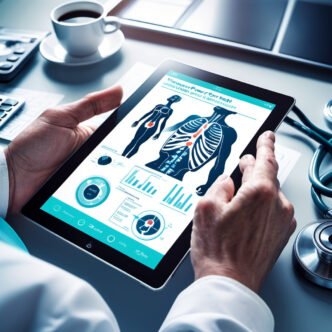Health technology, commonly referred to as health tech, is revolutionizing the way healthcare is delivered, managed, and experienced. From wearable fitness trackers to artificial intelligence-driven diagnostics, health tech innovations are not only enhancing patient outcomes but also redefining the global healthcare landscape. In this article, we delve into the multifaceted world of health tech, exploring its key components, recent advancements, and the challenges it faces as it continues to grow.
Understanding Health Tech
Health tech encompasses a broad spectrum of technologies designed to improve healthcare services and outcomes. These technologies integrate digital tools, data analytics, and innovative devices to optimize patient care, streamline operations, and empower individuals to take control of their health. The domain of health tech can be divided into several categories, including:
- Telemedicine: Remote consultations and virtual care that connect patients with healthcare professionals regardless of location.
- Wearable Devices: Gadgets like smartwatches and fitness bands that monitor vital signs and encourage healthier lifestyles.
- Artificial Intelligence (AI): Machine learning algorithms that enhance diagnostics, predict diseases, and personalize treatments.
- Electronic Health Records (EHRs): Digital systems that centralize patient information, making it accessible to authorized medical personnel.
- Medical Devices: Advanced tools such as robotic surgical systems and portable diagnostic kits.
- Mobile Health Apps: Applications that offer everything from medication reminders to guided meditation sessions.
Recent Advancements in Health Tech
The rapid pace of technological innovation has brought about transformative changes in health tech. Below are some notable advancements:
- AI in Diagnostics: AI-powered systems like IBM Watson Health and Google’s DeepMind have demonstrated remarkable accuracy in diagnosing conditions such as cancer, diabetic retinopathy, and cardiovascular diseases. These systems analyze vast datasets to identify patterns and provide insights that might elude human clinicians.
- Telehealth Boom: The COVID-19 pandemic accelerated the adoption of telemedicine. Platforms such as Teladoc Health and Amwell have enabled millions of patients to receive care from the safety of their homes. Telehealth has also expanded access to specialists in remote and underserved areas.
- Wearable Health Tech: Devices like the Apple Watch and Fitbit are no longer limited to tracking steps and heart rate. Advanced models can now detect atrial fibrillation, monitor oxygen saturation, and even predict menstrual cycles, providing users with comprehensive health data.
- Genomics and Personalized Medicine: The integration of genomic data into healthcare is paving the way for personalized treatments. Companies like 23andMe and Illumina offer genetic testing that helps identify predispositions to diseases, enabling tailored preventive measures and therapies.
- Remote Monitoring: Remote patient monitoring devices, such as continuous glucose monitors for diabetes and IoT-enabled blood pressure cuffs, allow healthcare providers to track patients’ conditions in real time, reducing hospital visits and improving chronic disease management.
- Virtual Reality (VR) in Therapy: VR is emerging as a powerful tool for pain management, physical therapy, and mental health treatment. Applications like those from XRHealth offer immersive experiences that help patients manage anxiety, recover from injuries, or undergo exposure therapy.
Benefits of Health Tech
The benefits of health tech are wide-ranging, impacting various stakeholders within the healthcare ecosystem. Here are some key advantages:
- Improved Patient Outcomes: By enabling early detection, accurate diagnosis, and personalized treatments, health tech significantly enhances patient outcomes.
- Cost Efficiency: Automated processes and remote care reduce operational costs for healthcare providers and minimize expenses for patients.
- Increased Accessibility: Telemedicine and mobile health apps bring healthcare to remote and underserved populations, bridging gaps in the delivery of medical services.
- Enhanced Patient Engagement: Wearables and health apps encourage individuals to actively participate in their health management, fostering a culture of prevention and self-care.
- Streamlined Operations: Digital tools like EHRs and AI-powered management systems optimize administrative workflows, reducing paperwork and improving efficiency.
Challenges Facing Health Tech
Despite its immense potential, the health tech industry faces several challenges that must be addressed to ensure its sustainable growth:
- Data Privacy and Security: As health tech relies heavily on data, safeguarding sensitive information against breaches and cyberattacks is a top priority. Robust encryption and compliance with regulations like GDPR and HIPAA are essential.
- Regulatory Hurdles: Gaining approval for new technologies can be a lengthy and complex process. Regulatory bodies must balance the need for innovation with ensuring safety and efficacy.
- Interoperability: A lack of standardization across systems can hinder seamless data sharing and collaboration among healthcare providers.
- Digital Divide: While health tech has the potential to democratize healthcare, disparities in digital literacy and access to technology can create inequities.
- Ethical Concerns: The use of AI and genetic data raises ethical questions about privacy, consent, and the potential misuse of sensitive information.
- Cost Barriers: Although health tech reduces long-term costs, the initial investment in devices, infrastructure, and training can be prohibitive for smaller practices and low-income populations.
The Future of Health Tech
The future of health tech is poised to be transformative, driven by emerging technologies and evolving healthcare needs. Key trends to watch include:
- Integration of AI and Blockchain: Combining AI with blockchain technology could enhance data security and transparency, enabling more reliable and efficient healthcare systems.
- Expansion of Virtual Care: Beyond telemedicine, virtual care models may include AI-driven chatbots, digital therapeutics, and remote surgeries performed using robotic systems.
- Advanced Biosensors: Next-generation wearables could integrate advanced biosensors to monitor an even wider array of health metrics, including stress levels and hydration.
- 5G Connectivity: The rollout of 5G networks will improve the speed and reliability of telemedicine, remote monitoring, and data sharing.
- Focus on Mental Health: With increasing awareness of mental health issues, health tech solutions like AI-powered therapy apps and VR for exposure therapy will gain prominence.
- Global Collaboration: Cross-border partnerships and data-sharing initiatives will drive innovation, addressing global health challenges such as pandemics and chronic disease management.
Conclusion
Health tech is reshaping the future of healthcare, offering solutions that were once the realm of science fiction. By harnessing the power of technology, we can improve patient outcomes, enhance accessibility, and create a more efficient and equitable healthcare system. However, to fully realize its potential, the industry must address challenges related to data security, interoperability, and ethical considerations. As we stand on the cusp of a healthcare revolution, the promise of health tech is both inspiring and imperative, paving the way for a healthier, more connected world.













